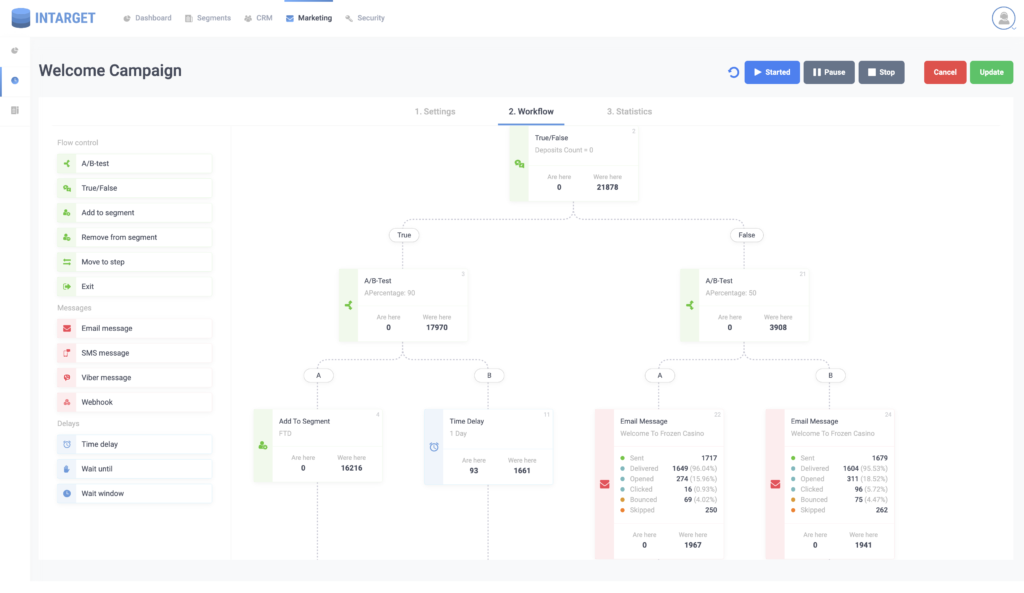We will not make a discovery if we say that iGaming is a highly competitional market. There are thousands of online casinos trying to encourage players to sign up and spend money exactly on their sites, with more and more casinos emerging all the time. To generate revenue, casinos have to employ a range of marketing techniques. One of the most prominent of these is trigger marketing.
General Types of Triggers in Marketing
What exactly trigger marketing is? It’s a specific type of marketing where certain triggers determine when and how targeted messages (adverts, notifications, emails, etc.) must reach potential customers. There are two main types of trigger marketing: user-based actions and limited-time events.
User-based actions are triggers specific to a person. The trigger could be something like looking at particular items at an online retailer. If someone does this, he could then receive adverts for similar items and it calls trigger marketing.
The more the user interacts with a site, the more personalised the adverts become.
Limited-time events are a lot broader. The run-up to Christmas is a great example. Companies send out adverts or set campaigns featuring festive gifts in the weeks, or even months before Christmas. The seasonal events and occasions such as New Year, Valentine’s Day and Halloween are other good examples. Some companies may even send out promotions exactly on the day or shortly before a customer’s birthday.
What Are 4 Types of Event-Based Marketing
User-based actions can be divided into four main types. Let’s have a detailed look at what these are:
- Border. What this refers to is when a customer does too much of a particular action. For example, the customer spends a particularly large amount of money or uses the site’s services a lot more regularly than others.
- Returning. It is always based on the customer’s data. The main type of returning trigger that’s used is the membership renewal or anniversary congratulations.
- Transactional. A transactional trigger is generated from a customers’ purchases or any other kinds of transactions, requests they carry out on the site.
- Behavioral. For this type of trigger, a customers’ behavior is analysed through using data and seeing how they’ve interacted with a site. It’s about determining how customers behave and what their transactions history looks like to develop targeting adverts accordingly.
What Is Behavior-Based Marketing?
Of the four main types of trigger marketing, behavioral or event-based marketing is perhaps the main one that companies and brands apply successfully nowadays. We’ve already mentioned how customer’s actions are used to determine a certain trigger, and now we’ll have a more detailed look at event-based marketing.
It’s incredibly common these days for all kinds of websites to track what you do. Most sites use cookies, for example. The aim is to see how the customer interacts with the site and tailor the company’s services and products accordingly so he gets a personalised experience. The idea behind this is that if you get what you want from the site and feel comfortable, you’re more likely to stay, be satisfied and will not think of switching to a competitor’s site.
What online casinos want from their customers is to engage with their site as much as possible. People are expected not only to sign up but to also spend significant money playing games and using the brand’s services regularly. One of the main ways casinos keep players engaged is exactly behavioral marketing. Casinos actively monitor how players interact with the site and use the data they obtain to send out push notifications, emails, reminders, adverts or special bonuses.
Here are some actual behavioral marketing examples: if you search for a video game, you can receive an advert showing several different popular other ones. Some adverts may encourage you to buy “add-on” products. After buying a video game, for example, you may see an advert that says something like ‘People who bought X video game also bought these portable chargers’.
Behavioral marketing triggers can also include discounts and promotional codes. For example, you are looking for a particular item, then see an advert promoting similar items at reduced prices. Some may even focus on giving you advice instead of making purchases. After looking at one type of item, you could see as well an advert asking if you need recommendations.
Why Is Event-Based Marketing so Meaningful Today?
Behavioral marketing is meaningful these days because of two things: the first is that software can enable us to have an increasingly more personalised experience when visiting websites; the second is that people respond better to personalised adverts, rather than generic, mass-market ones.
Many companies and brands use event-based trigger marketing to boost their LTV — this is a term that refers to the lifetime value of a customer. Whenever a company acquires a new customer, ideally they want two things from that customer: a long-term relationship (i.e. the customer keeps coming back) and a regular profit. By continuing to use trigger marketing, a company can increase the LTVs of its customers and, therefore, generate more income in the long-run.
Event-Based Trigger Marketing in the iGaming Business: Case Study
There are many examples of event-based trigger marketing techniques being used for the iGaming industry. Below are the most common:
- Welcome Bonuses. This one is straightforward. A customer signs up to an online casino and is offered the welcome bonus, which can offer free spins or match bonus in case of the first deposit.
- Loyalty Trigger. Some casinos send out bonuses to players who have been customers for some period of time but did not play lately, encouraging them to keep staying loyal or revisit the casino they’ve been a member of for so long. It’s common practice for casinos to send special bonuses to reward the players’ loyalty and encourage them to keep playing.
- Cancelled Transactions. If a player has a problem carrying out a transaction for whatever reason, he may receive a notification prompting him to get help.
- Congratulations on Big Wins. If a player’s lucky enough to scoop a large win, a casino may send a personalised message with congratulations on the win, encouraging him to keep playing at the casino.
- Mystery Rewards. Some casinos offer mystery rewards to players if they, for instance, lost a certain % of their balance (these can be a deposit bonus, cashback or free spins). If a gambler lost the game, he may decide to quit playing, while targeted bonuses can help change his mind.
- Notifications About Jackpots. If a progressive jackpot is getting quite big, a casino may send out a notification to let players know about the opportunity to win this large prize.
- Hot Trends. What many casinos do is they tie new game releases with their promotions. For example, if a new slot is released, a casino may offer a bonus that can be used only on this slot. Popular slots and games also can be a topic for promotions.
- Bonuses for Personal Information. A casino may reward you with bonuses for sharing and confirming personal details. These can include info on your personal social media pages.
There are lots of different cases in the iGaming industry, where behavioural marketing is used. Players tend to interact with online casinos a lot, so there’s a wealth of information casino operators have at their disposal to deliver nicely targeted communication with their players. With so many gambling sites out there, it’s more important than ever for operators to retain the players they attracted once. They use trigger marketing not only to keep reminding players of their brand but also of opportunities they may get and bonuses they’re entitled to.
Traditional marketing is still used in iGaming, but it’s becoming clear that a more personalised strategy is a step forward; it’s about giving players exactly what they want when they want it and figuring out how best to maximise their engagement.
Conclusion
These days, traditional marketing, which is quite broad and general, can’t go so far. For the most effective results, more personalised marketing has to be done. Behavior-based marketing can be a very effective tool because it’s all about delivering customized products and services in response to the customer’s actions – in other words, it’s as much personalized marketing tool as it can be.
As you see, one of the main things in trigger marketing is the right timing. You need to understand exactly when your customers are open to your offers and more likely to accept. When your offer coincides with the behavioral event or occasions it leads to great traction between your marketing and a customer.
In this article, we’ve looked at how event-based trigger marketing is applied to the iGaming industry. However, this type of marketing can be used almost in any industry, and it has the right to be characterized as the most effective.

